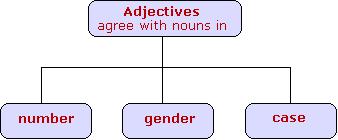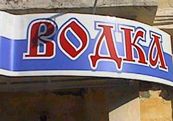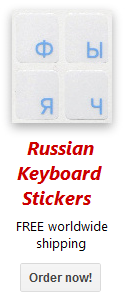 FR FR |
About us | Home | User agreement | Link to us |
Adjectives in Russian
Adjectives are words that describe nouns or pronouns. All Russian adjectives must agree with nouns in number, gender and case. For example, if you have a book (книга) and want to say that it is interesting (интересный), you must know that the noun книга is in the nominative-feminine-singular form. Then you should give the correct form to the adjective you are using. You will be on the right track if you say интересная книга (intresting book).

Note that in dictionaries all adjectives are given in the nominative masculine singular, like интересный, хороший, весёлый.
To form the proper form of an adjective, you should know how their endings change depending on number, gender and case. We listed the most common endings for adjectives in the nominative singular and plural forms, so that you are able to compose simple phrases.
The majority of Russian adjectives have a stem ending in a hard consonant. In other words, their last letter before the ending is a hard consonant (новый, белый). In the nominative case, such adjectives have the ending -ый if they are masculine singular, the ending -ое if they are neuter singular, and the ending -ая if they are feminine singular. The plural form of such adjectives is the same for all genders and always ends in -ые.
Endings for adjectives in the nominative singular and plural
(stressed vowels are underlined)
| Singular | Plural (any gender) (-ые) |
||
| masculine (-ый, -ой) |
neuter (-oe) |
feminine (-ая) |
|
| новый,
красный молодой, лесной |
новое, красное | новая, красная | новые, красные |
The adjectives with a stem ending in the soft н sound acquire the endings -ий, -ее, -яя, -ие in the nominative masculine singular, neuter singular, feminine singular, and plural respectively. These adjectives are called soft adjectives and always have a stress on the stem, as in синий.
The adjectives with a stem ending in letters к, г, х, ж, ш, ч, щ have the masculine singular ending -ий (маленький - small), the feminine singular ending in -ая (маленькая), and the plural ending -ие (маленькие). In the neuter singular such adjectives end in -oe after г, к, х (маленькое), and end in -ee after ж, ш, ч, щ if stress is on the stem (свежее молоко - fresh milk) otherwise it has the ending -oe (большое окно - big window).
There is a small group of adjectives called stressed adjectives. They have the ending -ой instead of -ый or -ий in the nominative masculine singular. This ending is always stressed on the letter o as in молодой (young), большой (big), другой (another).
Endings for adjectives with a stem in к, г, х and ж, ш, ч,
щ
(stressed vowels are underlined)
| Stem ends in | Singular | Plural (any gender) (-ие) |
||
| masculine (-ий, -ой) |
neuter (-ое, -ое) |
feminine (-ая) |
||
| к, г, х | маленький морской, другой |
маленькое морское, другое |
маленькая | маленькие |
| ж, ш, ч, щ | свежий | свежее | свежая | свежие |
Related Lessons
 Russian Lessons
Russian Lessons
- Russian alphabet
- Names of letters
- Russian Q&A new
- Pronunciation: Cons.
- Pronunciation: Vowels
- Noun Gender/Number
- Cases of Nouns
- Russian Greetings
- Personal Pronouns
- Learning Russian
- 1000 Common Words
- 500 Russian Verbs
- Top Russian Nouns
- » All lessons
- » Guest lessons
 Browse Topics
Browse Topics
- Start learning Russian
- Forum
- Bookstore
- Dictionaries
- Russian - basic
- Russian - adv
- Pronunciation
- Russian Blog new
- Reading
- Test & quizzes
- Translation
- Verbs
- Verb Conjugations
- Russian numbers
- Russian Tests new
- Vocabulary
- Writing
- Folk music
- Fun stuff
- Leo Tolstoy
- Learner's lore
- Literature
- Personal blogs
- Picture Dictionary new
- Proverbs
- Publications
- Radio & TV
- Russian culture
- Schools in Russia
- Russian Words
- Russian names
- Software
- Russian Words iPhone
Clicks the "Like" button below to get daily updates on Facebook!
Click "Add to circles" to learn Russian on Google+

Search MasterRussian

English » Russian dictionary

WORD OF THE DAY
![]() RSS
|
iGoogle
|
My Yahoo!
RSS
|
iGoogle
|
My Yahoo!
Meaning: road, route, way
Pronunciation: [dah-ROH-gah]
Learn Russian words! »
TODAY'S STREET SIGN

Russian: Водка
English: Vodka
FOLLOW US ON TWITTER

MasterRussian on Twitter


